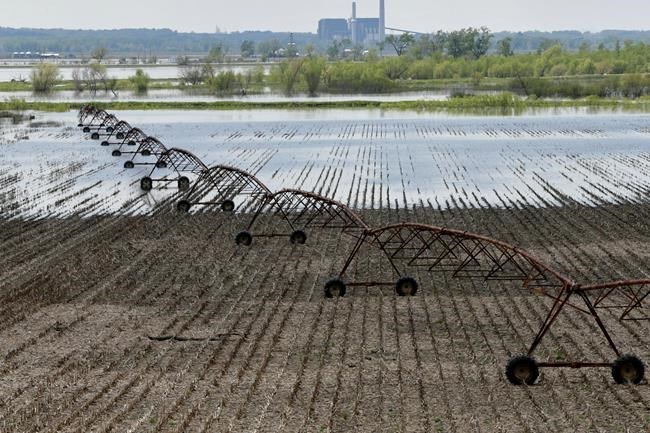
In this May 10, 2019 photo, flood waters from the Missouri River cover fields north of Hamburg, Iowa. The communities that flooded this spring after levees failed along the Missouri River will likely remain exposed to flooding for at least several more months. More than 40 levees were damaged but only a handful of construction contracts to fix them have been issued. Two of those are for repairs to levees near Hamburg, Iowa, but even the initial repairs won't be done until after the spring rainy season. (AP Photo/Nati Harnik)
Republished May 14, 2019 - 9:57 PM
Original Publication Date May 14, 2019 - 9:06 PM
OMAHA, Neb. - Communities that were flooded when levees failed along the Missouri River earlier this spring will likely remain exposed to high water for months to come, leaving displaced residents wondering when — or if — they will be able to return and rebuild their homes.
The U.S. Army Corps of Engineers — the federal agency that regulates flood control along the waterway — has been assessing the levees that were crippled in March when heavy rain and snow melt caused the river and its tributaries to overflow in Iowa, Nebraska, Missouri and Kansas. But repairs have been hindered by the extent of the damage and lingering floodwaters.
The flooding that caused an estimated $3 billion in damage in the Midwest forced 94-year-old Ardis Rogers from her farm near the small community of Percival in southwest Iowa. She said she's heard from people who flew over her home that it appears dry but that the roads leading to the property remain flooded.
"I haven't a clue of when I can go home, and there's no place like home," said Rogers, who has been staying with friends in Hamburg. "We're dependent on the levees, and we're dependent on the Corps of Engineers."
Only a handful of the more than 40 construction contracts needed to fix the damaged Missouri River levees have been issued.
"Until those levees get back up to regular height, we won't feel secure," said Sherri Bowen, spokeswoman for Mills County, Iowa, whose hometown of Glenwood sits behind a broken levee. "It's very stressful."
Even the quickest repairs — plugging holes in two levees near Hamburg and Percival, Iowa — won't be completed until the spring rainy season is over.
"We're working hard to get that initial level of protection in place," said Lowell Blankers, who oversees levee repairs in Iowa and Nebraska for the Corps.
But completing the repairs will be difficult.
"We have been hampered by poor conditions," said Jud Kneuvean, emergency manager with the Kansas City district of the Army Corps of Engineers.
Often after floods, officials are able to drive along the levees to assess the damage, but that hasn't been an option this spring in many places where floodwaters surged over the top. The Corps is relying more heavily than ever on watercrafts and helicopters to find out what is going on. Even in Hamburg, where repair work is underway, some of the still-flooded job sites can't be accessed without a boat.
Once the damage surveys are completed, the Corps will review which levees were the most effective in protecting populations and the most critical infrastructure. That helps determine which repair projects come first.
The federal government will pay for all of the repairs to levees in the federal system and 80% of the cost to repair levees owned by cities or agricultural groups.
Until the levees are repaired, any heavy rain will threaten Missouri River communities with more flooding, said Mike Crecelius, emergency manager for Fremont County, which includes Hamburg.
"It's going to be a long, treacherous summer for us," Crecelius said.
The dragging levee repairs make it hard for people to decide when or if to rebuild their homes and businesses. Only six of the 32 businesses in Hamburg have reopened since the floods, and residents are still boiling water.
"Right now we're not alarmed," Hamburg Mayor Cathy Crain said. "But we have to get through May and June."
___
Associated Press Writer Scott McFetridge contributed to this report from Des Moines, Iowa.
News from © The Associated Press, 2019